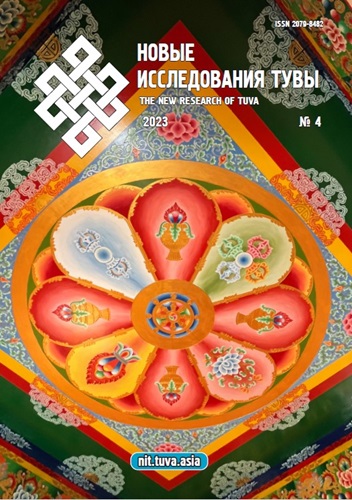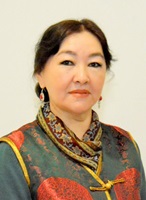Neser and shuluk-chugaa: Variants of prosopoetic synthesis in Tatar and Tuvan literatures
DOI:
https://doi.org/10.25178/nit.2023.4.2Keywords:
Tatar literature; Tuvan literature; genre; symbol; mythological semantics; rhythm; literary mode; extramodal form; extra-artistic elementAbstract
The authors specify the types of interaction between poetic and prose strategies for artistic thinking in Tatar and Tuvan literatures using the cases of neser by Shamil Anak (1928–2005) and Ramziia Gabdelkhakova (b. 1959) as well as shuluk-chugaa by Eduard Mizhit (b. 1961) and Alexander Darzhay (1944–2016). The article highlights parameters of the ethnic and cultural identity of the genres of neser and shuluk-chugaa. They are typologically close, but have different origins in Tatar and Tuvan literatures: in Tatar literature, the genre form of neser goes back to the medieval literatures of the East where rhythmic prose (saj') was widespread, and in the works of contemporary Tuvan writers, shuluk-chugaa appears as a result of the transgression of the genre, mainly typical of French literature.
The research into the poetics and features of the functioning of neser and shuluk-chugaa in the Tatar and Tuvan literatures of the late 20th and early 21st centuries is based on the criteria established in literary studies for distinguishing poetry and prose as formal and substantive categories.
It has been found out that both Tatar and Tuvan writers use similar techniques for poetization of prose texts. A distinctive feature of E. Mizhit’s prose miniatures and elegies-neser by Sh. Anak is the influence of poetic structures reflecting the characteristics of mythological thinking on the depicted world. Generalization of the emotional and psychological experience of lyrical subjects is carried out on the ways of symbolization of the subject matter. In neser by Sh. Anak and R. Gabdelkhakova, rhythm-forming function is performed by the method of paradigmatization of the text and the introduction of a network of equivalences into it. These equivalences are manifested both in terms of content and in terms of expression. Poems in prose by E. Mizhit are prosimetric works. Their integrity creates the complementarity of poetic and prosaic artistic worldviews. The expansion of the synthesizing possibilities of prose miniatures in Tuvan and Tatar literatures is demonstrated by the case of the works by A. Darzhay (in his writings, shuluk-chugaa functions as a capacious and flexible artistic form that incorporates elements of a parable) and R. Gabdelkhakova (in her prose, neser exists as a lyric and epic work where the leading role belongs to the lyrical trend).
The conducted research makes it possible to clarify and deepen our understanding of genre processes in Tatar and Tuvan literatures as well as to characterize a kind of micromodel of the inter-literary process presented in its synchronic aspect.
References
Bakhtin, M. M. (1975) Voprosy literatury i estetiki: issledovaniia raznykh let [Questions of literature and aesthetics: Studies of different years]. Moscow, Khudozhestvennaia literatura. 504 p. (In Russ.).
Gasparov, M. L. (2001) Stikhotvorenie v proze [A poem in prose]. In: Literaturnaia entsiklopediia terminov i poniatii [Literary encyclopedia of terms and concepts] / ed. by A. N. Nikoliukin. Moscow, Intelvak. 1600 clmns. Clm. 1039. (In Russ.).
Zhirmunsky, V. M. (1975) Teoriia stikha [Theory of verse]. Leningrad, Sovetskii pisatel', Leningrad Branch. 664 p. (In Russ.).
Zagidullina, D. F. (2013) Modernizm v tatarskoi literature pervoi treti XX veka [Modernism in the Tatar literature of the first third of the 20th century]. Kazan, Tatar Book Publishing House. 207 p. (In Russ.).
Kviatkovskii, A. P. (1966) Poeticheskii slovar' [Poetic dictionary] / ed. by I. Rodnianskaia. Moscow, Sovetskaia entsiklopedia. 376 p. (In Russ.).
Kozlov, V. I. (2009) Zdanie liriki. Arkhitektonika mira liricheskogo proizvedeniia [The building of lyrics. Architectonics of the world of a lyrical work]. Rostov-on-Don, Southern Federal University Publ. 240 p. (In Russ.).
Lotman, Yu. M. (1998) Ob iskusstve [On the arts]. St. Petersburg, Iskusstvo—SPB. 702 p. (In Russ.).
Meletinsky, E. M. (2000) Poetika mifa [The poetics of myth]. Moscow, Vostochnaia literatura. 407 p. (In Russ.).
Mozheiko, M. A. (2001) Derevo [Tree]. In: Postmodernizm [Postmodernism] : An encyclopedia / comp. and by ed. by A. A. Gritsanov and M. A. Mozheiko. Minsk, Interpresservis ; Knizhnyi Dom. 1040 p. Pp. 204–208. (In Russ.).
Orlitskiy, Yu. B. (2002) Stikh i proza v russkoi literature [Verse and prose in Russian literature]. Moscow, Russian State University for the Humanities. 685 p. (In Russ.).
Potebnja, A. A. (2003) Teoreticheskaia poetika [Theoretical poetics]. St. Petersburg, Philological Faculty at St. Petersburg State University ; Moscow, Akademiia. 384 p. (In Russ.).
Smirnov, I. P. (2001) Smysl kak takovoi [The sense per se]. St. Petersburg, Akademicheskii proekt. 352 p. (In Russ.).
Teoriia literatury [Theory of literature] (2004) : A study guide : in 2 vols. / ed. by N. D. Tamarchenko. Moscow, Akademiia. Vol. 1. 512 p. (In Russ.).
Toporov, V. N. (1994) Reka [River]. In: Mify narodov mira [Myths of the peoples of the world] : in 2 vols. / ed. by S. A. Tokarev. Moscow, Sovetskaia entsiklopediia. Vol. 2. 719 p. Pp. 374–376. (In Russ.).
Toporov, V. N. (1995) Mif. Ritual. Simvol. Obraz : Issledovaniia v oblasti mifopoeticheskogo : Izbrannoe [Myth. Ritual. Symbol. Image : Research in the field of mythopoetic : Selected works]. Moscow, Progress ; Kul'tura. 624 p. (In Russ.).
Tynyanov, Yu. N. (1993) Teoriia literatury [Theory of literature]. In: Tynyanov, Yu. N. Literaturnyi fakt [Literary fact]. Moscow, Vysshaia shkola. 319 p. Pp. 23–157. (In Russ.).
Tiupa, V. I. (2001) Narratologiia kak analitika povestvovatel'nogo diskursa («Arkhierei» A. P. Chekhova) [Narratology as an analytics of narrative discourse (“The Bishop” by A. P. Chekhov)]. Tver, Tver State University. 58 p. (In Russ.).
Tiupa, V. I. (2008) Stikhotvorenie v proze [A poem in prose]. In: Poetika : slovar' aktual'nykh terminov i poniatii [Poetics: A dictionary of current terms and concepts] / ed. by N. D. Tamarchenko. Moscow, Kulagina’s Publ. ; Intrada. 358 p. P. 253. (In Russ.).
Tiupa, V. I. (2013) Diskurs / Zhanr [Discourse / Genre]. Moscow, Intrada. 211 p. (In Russ.).
Zaһidullina, D. F. (2007) Nәser [Neser]. In: Әdәbiiat beleme: Terminnar һәm tөshenchәlәr sүzlege [A dictionary of literary terms and concepts] / ed. by T. N. Galiullin and D. F. Zagidullina. Kazan, Magarif. 231 p. Pp. 127–128. (In Tatar).
Mizhit, L. S. (2015) Eduard Mizhittiң alys shynche chүtkүlү [Eduard Mizhit’s longing for Truth]. In: Mizhit, L. S. Tyva shүlүk chogaalynyң delegeiinde [In the world of Tuvan poetry]. Kyzyl, Tyvapoligraf. 170 p. Pp. 71–86. (In Tuv.).
Mongush, Sh. A. (2009) Eduard Mizhittiң «Kaida siler?» dep proza-shүlүү [A prose poem “Where Are You?” by Eduard Mizhit]. In: Tyva chechen chogaal: sөөlgү үeniң shinchilelderi [Tuvan literature: Studies of recent years]. Kyzyl, Tyvapoligraf. 217 p. Pp. 187–206. (In Tuv.).
Khalit, G. (1975) Keshegә һәm chynlykka mәkhәbbәt belәn [With love for man and truth]. Kazan, Tatar Book Publishing House. 328 p. (In Tatar).
Published
How to Cite
Amineva V. R. and Mizhit L. S. Neser i shuluk-chugaa: varianty prozopoeticheskogo sinteza v tatarskoi i tuvinskoi literaturakh [Neser and shuluk-chugaa: Variants of prosopoetic synthesis in Tatar and Tuvan literatures]. New Research of Tuva, 2023, no. 4, pp. 22-43.DOI: https://doi.org/10.25178/nit.2023.4.2
Issue
Section

This work is licensed under a Creative Commons Attribution-NonCommercial 4.0 International License.

Author(s) license holder(s) grant rights for their work to the journal (grantee of a license) under the simple non-exclusive open license in accordance with Art. 1286.1 «Open license for a research work, work of literature or fine arts», Civil Code of the Russian Federation.
New Research of Tuva publishes articles under the Creative Commons Attribution-NonCommercial license (CC BY-NC).
Since it is an open license, author(s) reserve the right to upload the article to their institutional repository, submit it to another journal (if it allows republications), or republish it on their own website (in full, or in part).
However, several conditions apply here:
a) The republished version must always contain the name(s) and affiliation(s) of the author(s), the original title and the hyperlink to the original version on the New Research of Tuva website;
b) It must be in open access, free of charge, and no category of readers must be in any way whatsoever advantaged over general readership.
c) should the contribution be submitted elsewhere by its author(s) without substantial modification (30% or more of original text unchanged), the body of the article should contain a disclaimer that the original version was published in New Research of Tuva (with a link to the respective page)
The CC-BY-NC is a non-revocable license which applies worldwide and lasts for the duration of the work’s copyright.










